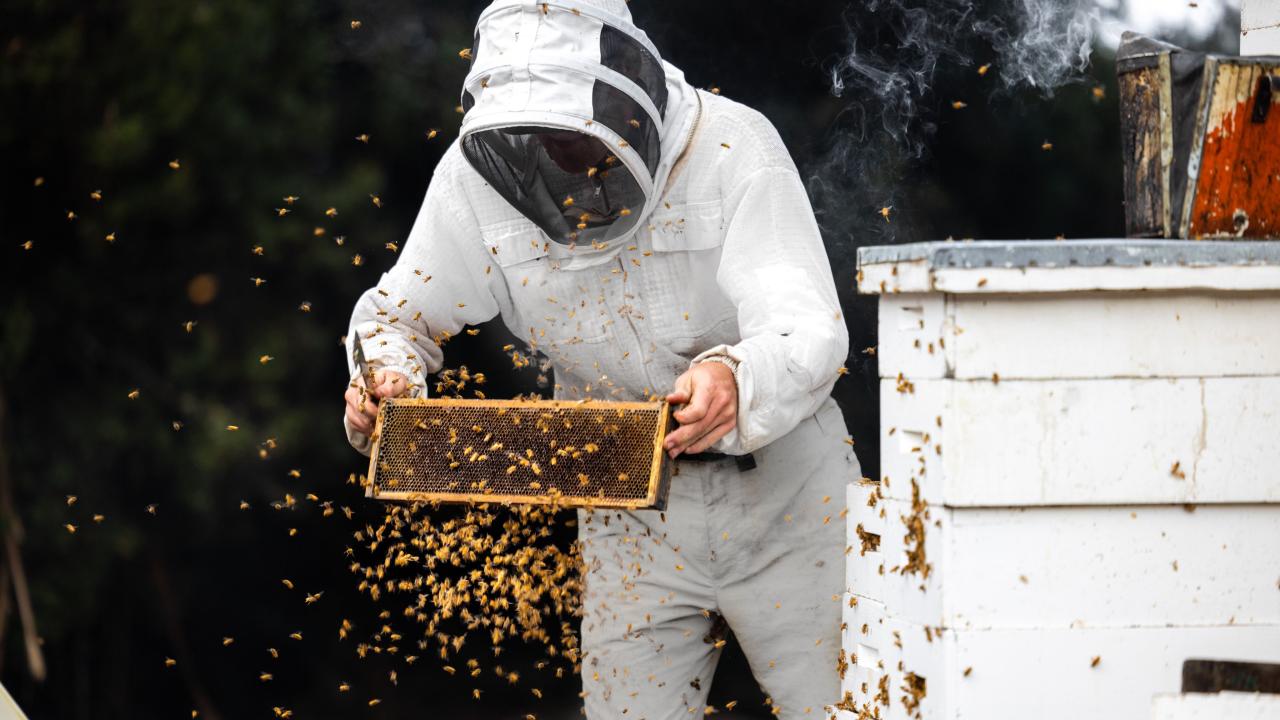Tasmanian beekeepers seek new markets amid honey oversupply

TASMANIAN beekeepers are seeking new markets as they face an oversupply of honey, with many local producers struggling to sell their excess stock.
Tasmanian Beekeepers Association president Lind say Bourke said the situation is affecting many Tasmanian producers, particularly with surplus honey from the past few seasons in part due to a flood of cheap imported honey last year.
“We’re lucky we get most of our honey from the rich rainforests in the north west, where we produce our renowned Manuka and Leatherwood honey,” Mr Bourke said.
“Unlike the rest of Australia that can get quite dry in sum mer, our rainforest areas are the perfect environment to keep producing high-quality honey.”
Mr Bourke said that the local market is saturated, and there was simply more honey avail able than could be consumed within the state or even across Australia.
“Theres a limit to what we can sell in our small state, we supply far too much for the state and Australia, so we need to find more markets overseas who know the quality of our honey and are prepared to pay more for it,” he said.
“All of us in Tasmania have stocks from the last couple of seasons in store, that’s the reality.”
Mr Bourke said that the key focus now was working closely with industry representatives and the government to find new opportunities in overseas markets.
Already Mr Bourke said they had been overseas twice in the last 12 months – to China and Singapore – to promote Tasmanian Manuka and Leatherwood honey.
“The populations of these places are incredibly large so there are great possibilities for us to find some good markets in those countries.” In a few months, Mr Bourke said Tasmanian beekeepers would be heading to Dubai to promote Tasmanian honey.
“We’ve got to find some new, over seas customers who are prepared to pay for the value of our honey.”
Mr Bourke said the Tasmanian Government has been proactive in supporting the honey industry, con tributing $150,000 for marketing campaigns including a short promotional film on Leatherwood honey.
“The Government has been very supportive, working with trade embassies across the world to open up new markets for us,” Mr Bourke said.
“Lots of things are progressing at the moment,” he said.
Mr Bourke said that one of the selling points for Tasmanian honey was the pristine environment it came from.
“The leatherwood honey that comes out of Tasmania is the purest honey in the whole world, there is absolutely no pollution in the west coast, it’s a pristine beautiful place and we get the no pollution in the west coast, it’s a pristine beautiful place and we get the which are very good for our gut health.
“Tasmanian honey has an advantage over the rest of Australia because we have the rainforests and those wet areas that other parts of the country don’t have.”
Mr Bourke said that in the future there may be a lot of opportunities for Australian honey in America. “America is a big country and a big importer of honey,” he said.
“They can only produce half of their honey consumption and hey are affluent people, they want to buy the best honey they can afford and I believe that comes from Australia so we’ve just got to get out there and show them the value,” he said.
Despite the challenges of oversupply, Mr Bourke is confident about the future of the Tasmanian honey industry.
“This is the best time to be promoting its importance to the rest of the world and to be putting energy into finding new markets in order to keep selling.”
However, he said a significant hurdle to overcome was the high cost of shipping and exporting. Mr Bourke said shipping a container of honey from Tasmania to Melbourne costs just as much as shipping it overseas.
“That’s been pretty hard for us producers, shipping is very expensive for us,” he said.
“It’s a barrier but we are positive people, we’ll overcome anything.”




Add new comment